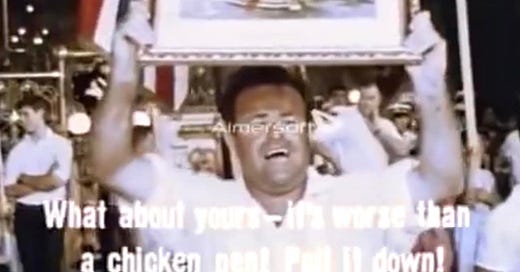ABC’s ‘Two Trumpets for St Andrew’ is a deep dive into 1968 Malta
1968 – don’t forget that year. A Mediterranean backwater was on the cusp of radical political change...
You have to watch Two Trumpets For St Andrew, an Australian production by ABC that is probably one of the most eye-opening documentaries about Malta, Maltese life and politics at a very particular moment in time: 1968.
1968 – don’t forget that year.
My father’s uncle, Guże Ellul Mercer, died in September 1961. As a Labour MP, one-time deputy prime minister to Dom Mintoff (1955-58), he was buried in the then-unconsecrated ground at the national (Catholic) cemetery, fittingly stylised as the “rubbish tip” (miżbla), for having fallen foul of the Curial establishment by being a member of the Labour Party executive. He was interdicted, and by force of the interdett, was denied the sacraments (it fell upon his brother, Franciscan priest Frankie Ellul Mercer, ordained as Fr Benedict, to administer the rite).

If you want to read more about the Interdett, check out MaltaToday’s The Unholy War: a five-part series on Malta’s Interdett, a series on the January 1961 Church Interdett, first published in 2005. It is a fantastic five-part series that spoke to protagonists of the time as well as relatives.
And there is also this interview (in Maltese) with lecturer Michael Grech (Junior College Sixth Form, University of Malta) and former Labour MP Joe Micallef Stafrace (who was not allowed to be married in Church, but in the sacristy, or vestry of the church).
But back to Two Trumpets For St Andrew: in Luqa, a microcosm of Malta as it presented itself to the world in the late 60s on the cusp of Dom Mintoff’s re-election (1971), seems to have it all:
The two rival band clubs have their own rival political alignments – Labour vs Nationalists (on the festa-partit phenomenon, see Jeremy Boissevain);
The dockyard foreman – father to 10 children – speak about his patriarchical role in “ruling” his wife and family, as well as his dockyard underlings;
While the dockyard foreman is a Labour man, his Nationalist neighbour works for the colonial forces’ R.A.F;
Mintoff’s ‘Oxbridge’ eloquence is in full display here as he explains how evil dwarf-prince Michael Gonzi has weaponised Catholicism’s salvation theory against Labour voters (and readers of the Labour press... talk about attacking democracy); and of course there is Gonzi himself trying to defend his theocratical imperiousness;
And finally, there is simply life itself in Luqa: children with women, men at work, playing cards and having a drink after work, the afternoon siesta, the Church bells ringing for mass – and during a Mintoff meeting.... it really is all there, an unchanging Mediterranean backwater in 1968 – while a cultural revolt is underway in Europe, Malta is a simple tourist getaway (and for tax exiles) where a socialist leader plans to build a new industrial base that will severe Malta from its import-dependence.
READ MORE
For further analysis, check out James Debono’s Malta’s Interdett: Scicluna exorcises Mikiel Gonzi’s legacy, where he assesses how Archbisohp Charles Scicluna, the most ‘political’ leader the Maltese Church has had since the 1960s, took the bold step of blessing the ‘unconsecrated’ graves of such Labour stalwarts as Guze Ellul Mercer on All Souls Day. “Has Scicluna realised that Gonzi’s legacy is the greatest obstacle to the Church’s attempt to regain political relevance?”
Do also read this piece by historian Mark Camilleri, Apologies or deceit? Scicluna and the deep wounds of the 1960s’ ‘interdett’, in which he calls Michael Gonzi “an educated thug who wielded his hostile power without any consideration to those he affected.”




